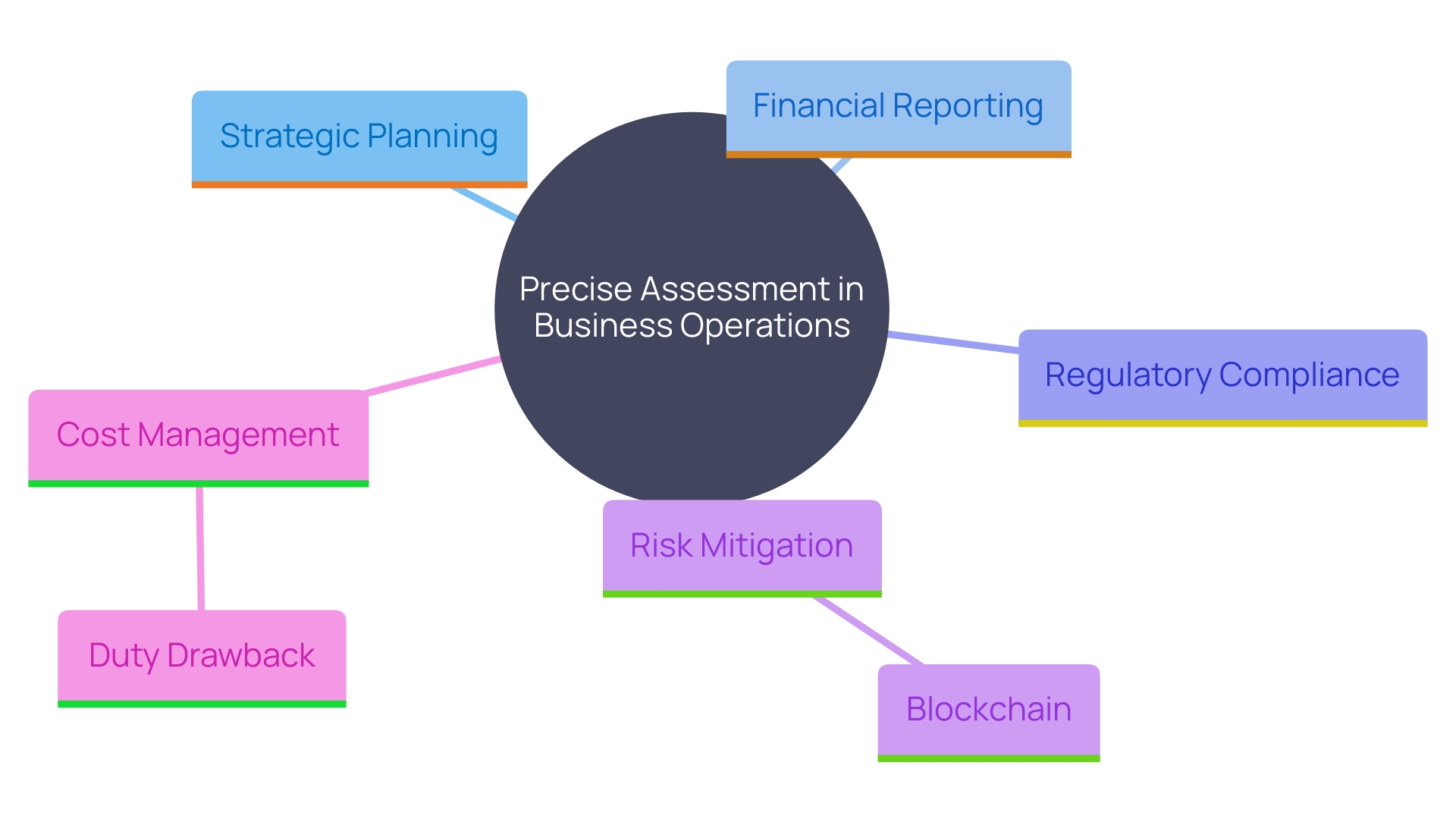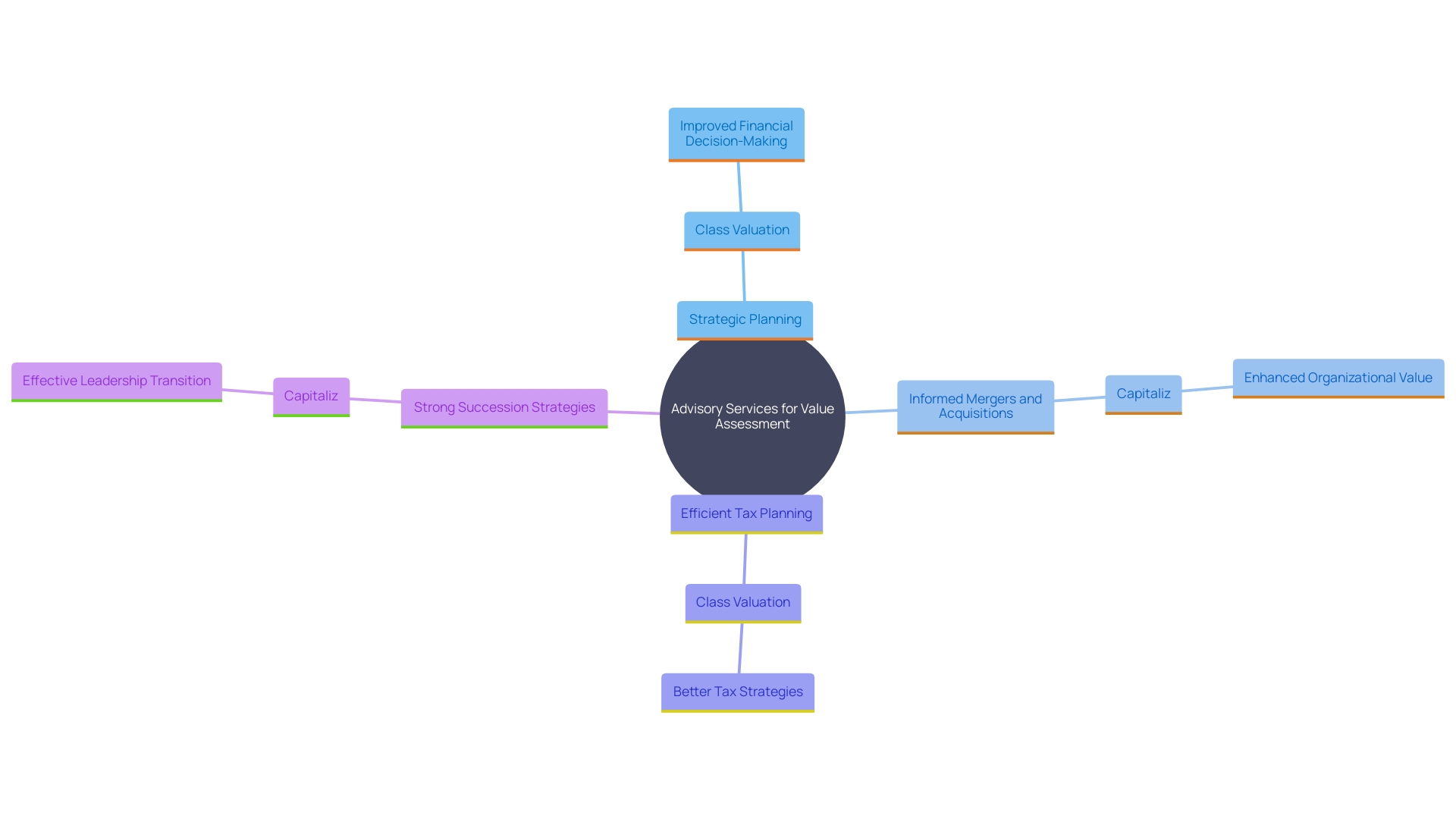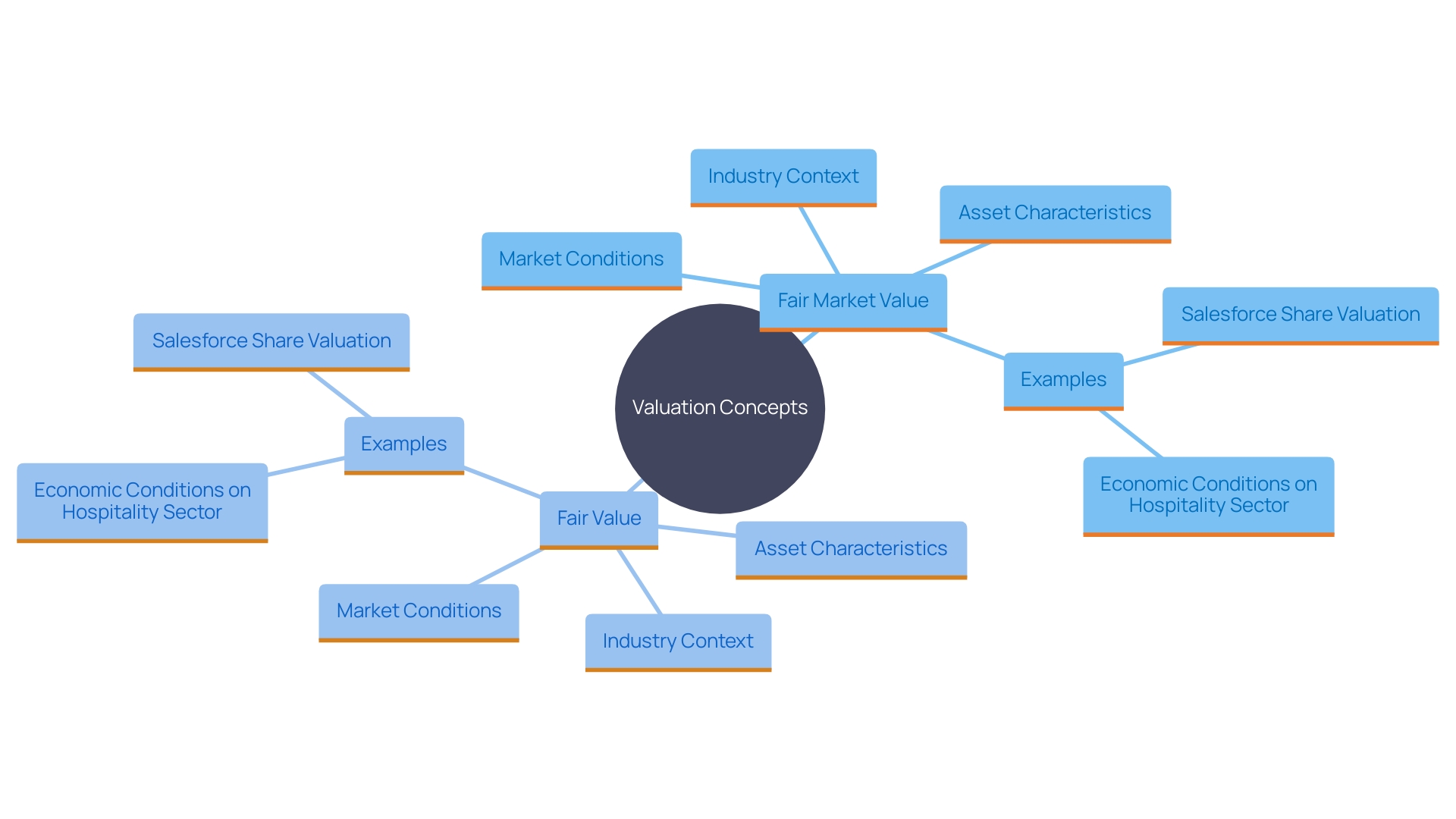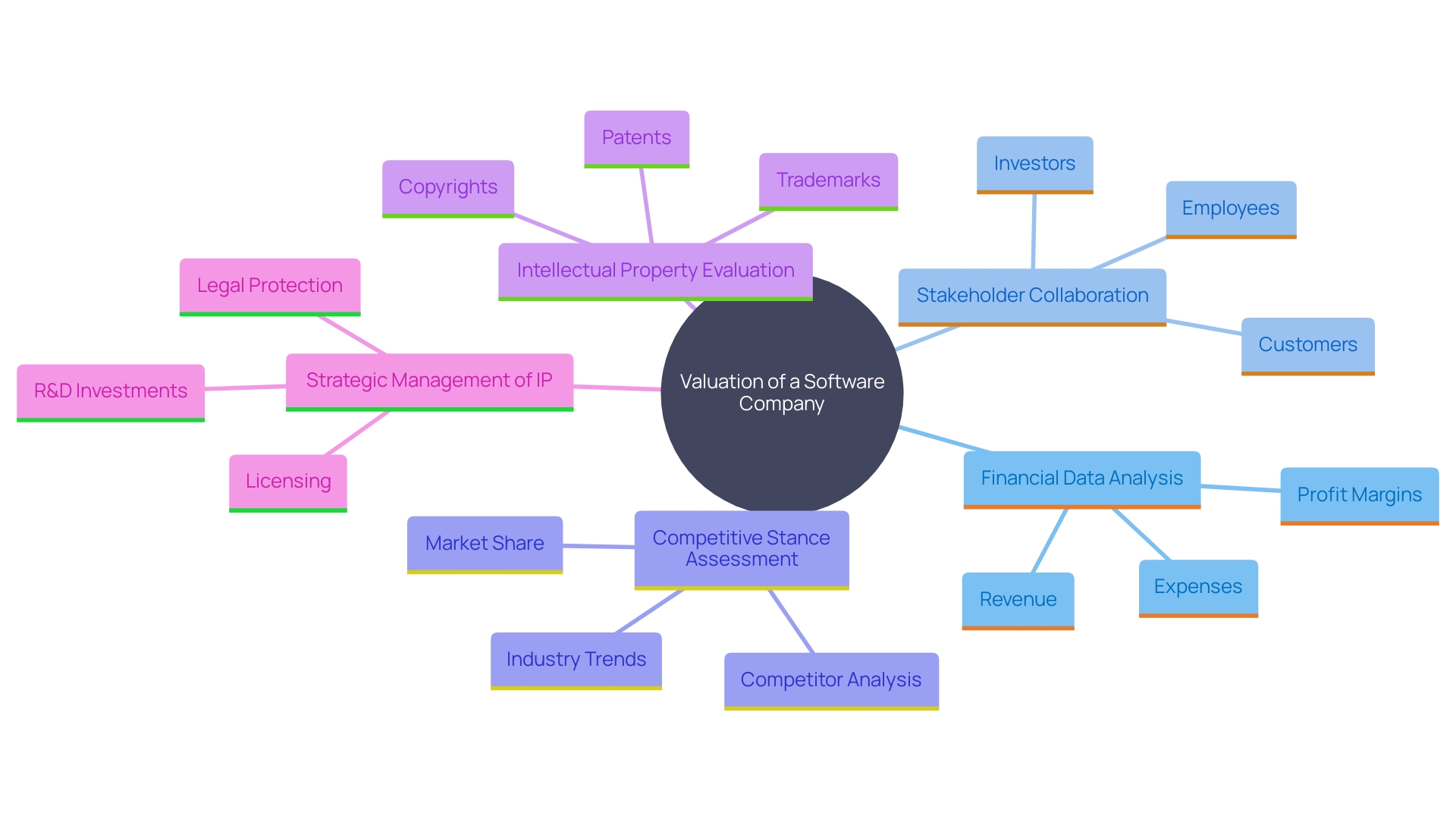Introduction
In an increasingly complex financial landscape, the role of valuation advisory services has never been more critical. These services provide indispensable support to businesses and shareholders by determining the true economic value of entities and their assets, a cornerstone for making strategic decisions in mergers, acquisitions, and financial reporting. With valuation experts adopting systematic approaches to assess both tangible and intangible assets, businesses gain a comprehensive understanding of their financial worth.
This article delves into the various valuation methodologies, the significance of accurate valuations, and the myriad benefits that professional valuation services offer. By examining the nuances between fair market value and fair value, and the pivotal role of professional valuation services, enterprises are better equipped to navigate dynamic market conditions, optimize financial strategies, and drive sustainable growth.
What is Valuation Advisory Services?
Valuation advisory services provide essential support to businesses and shareholders in determining the economic value of an entity or its assets. These services are crucial for making strategic decisions such as mergers, acquisitions, and financial reporting. Specialists in appraisal adopt a systematic approach to evaluate both tangible and intangible assets, ensuring clients have a comprehensive understanding of their investments' financial worth. This process is particularly significant in light of the increased activity in mergers and acquisitions, driven by diverse buyers, including private equity firms and smaller specialized firms, as noted in recent market trends. For instance, the high volume of deals and the rise of smaller transactions emphasize the need for accurate and comparable assessments. Furthermore, the assessment of intangible assets, like those related to football player transfers, poses distinct challenges and emphasizes the significance of uniform accounting policies. Firms like Crowe LLP and Cornerstone Advisors leverage their deep industry expertise to provide robust valuation services, assisting enterprises in uncovering hidden opportunities and navigating complex market dynamics.
Types of Valuation Approaches
Valuation advisory services utilize a variety of advanced methods to determine the actual worth of an enterprise or asset, each customized to particular goals and situations. The primary methods include the Asset Approach, Income Approach, and Market Approach. The Asset Approach, also referred to as the Cost-to-Duplicate Approach, assesses the worth of a company's tangible and intangible assets, estimating what it would require to rebuild the entity from the ground up. This method is particularly useful for startups and early-stage companies where tangible assets like technology and intellectual property are pivotal.
The Income Approach centers on the organization's capacity to produce future cash flows, making it suitable for firms with predictable revenue streams. This approach uses Discounted Cash Flow (DCF) analysis, which considers the startup’s risk profile and projected cash flows to provide a detailed and customized valuation. However, its accuracy heavily depends on the reliability of these projections, which can be challenging for organizations with limited operating history.
The Market Approach evaluates the business against similar transactions in the industry, offering a real-world perspective on its worth. This technique is especially enlightening in changing economic conditions but should be utilized with additional approaches to guarantee a thorough evaluation. 'The Scorecard Valuation Method, often utilized in early-stage startup assessments, assigns scores to critical success factors such as market opportunity, team strength, and product development progress.'. This structured framework provides both qualitative and quantitative insights, enabling investors to make informed decisions.
Each of these approaches has its strengths and limitations, and choosing the right method depends on the specific context and available data points. By comprehending and utilizing these diverse approaches, stakeholders can attain a more precise and comprehensive assessment of enterprises and assets.
The Importance of Accurate Valuation
Precise assessment is essential for informed decision-making in business operations, laying the foundation for strategic planning, financial reporting, and regulatory compliance. For instance, the Small Industries Development Bank of India (SIDBI) leverages blockchain technology to enhance transparency and mitigate risks associated with traditional lending practices. This innovative approach highlights the significance of accurate assessments, especially in reducing risks and avoiding financial losses. Moreover, assessments offer stakeholders a clear comprehension of asset value, thus enhancing their bargaining power in dealings. As seen in the practice of Duty Drawback, the capability to reclaim duties paid on imported items emphasizes the crucial importance of precise assessment in cost management and competitive positioning. By implementing strong appraisal techniques, organizations can enhance their financial approaches, ensuring adherence and maximizing their investment capabilities.

Benefits of Valuation Services
Utilizing advisory services for assessing value presents many advantages for organizations aiming to improve strategic planning, informed mergers and acquisitions, efficient tax planning, and strong succession strategies. Utilizing professional valuation insights allows organizations to make sound financial decisions that align with their long-term goals and operational needs.
For example, Class Valuation, a leading nationwide Appraisal Management Company (AMC), has been recognized for its ability to deliver outstanding quality and service by consistently leveraging the best people, products, processes, and technology. This method guarantees that their clients undergo a smooth transition and exceptional support, aiding in more informed and strategic choices.
Furthermore, Capitaliz's Dynamic Revaluation™ feature employs predictive intelligence, allowing advisers to determine the monetary impact of changes and investments in an enterprise. Recognizing that enterprises with effective succession strategies achieve a 15% greater worth, Capital assists owners in identifying, protecting, accelerating, unlocking, and managing value. Founder Craig West emphasizes the importance of continuous evaluation to understand the true impact of improving different areas of an organization over time.
A comprehensive approach to financial data analysis, considering differences in US GAAP and local GAAP requirements, is also crucial for multinational entities. This approach helps ensure compliance with local regulations and enhances the accuracy of financial reporting.
Integrating these assessment techniques and insights can greatly enhance a company's financial planning, ensuring lasting expansion and stability in a global environment.

Understanding Fair Market Value vs. Fair Value
Grasping the difference between equitable worth and fair assessment is essential in appraisal consulting services. Fair market worth is the price an asset would bring in an open market between a willing buyer and seller under normal conditions. This figure is often used in scenarios like mergers and acquisitions, where the price needs to reflect a neutral, unbiased transaction.
Fair worth, in contrast, includes a wider range of factors, encompassing the particular conditions related to the asset or enterprise. For instance, Salesforce's revised fair worth estimate of $255 per share, with a range of $204-$306, illustrates how fair worth can vary depending on economic conditions and company-specific elements such as net cash on the balance sheet and projections for future free cash flow. This method enables a more detailed assessment that takes into account both the wider economic setting and the distinctive features of the business being assessed.
In practice, the industry context, growth rates, and competitive positioning are vital in forecasting future performance and determining fair value. For example, in the hospitality sector, elements such as tourism trends and economic conditions in the property's location play a significant role in forecasting future revenue streams and evaluating potential risks. Likewise, Salesforce's possible expansion to $290 billion by 2026 at a compound annual growth rate of 13% emphasizes the significance of these wider factors in assessment.
In essence, while fair market value offers a snapshot of an asset's worth under typical market conditions, fair value provides a deeper, more context-rich assessment that can better inform strategic financial decisions.

The Role of Professional Valuation Services
Expert assessment services are essential for maneuvering through the complex financial landscape encountered by companies today. These experts perform comprehensive analysis of financial data, providing actionable insights that drive informed decision-making. A key aspect of this process is the collaborative effort with stakeholders to ensure the alignment of the valuation process with the organization's strategic objectives and compliance requirements.
Precisely determining a company's worth, particularly in the software sector, necessitates a comprehensive evaluation of its competitive stance. This includes assessing elements like share, growth path, and the durability of its competitive advantage. A strong market position often translates to a competitive advantage, which can be seen in customer loyalty, unique product offerings, or advanced technology. For instance, a software company's consistent track record of innovation, whether through R&D efforts or strategic acquisitions, significantly enhances its worth.
Intellectual property (IP) is another essential element in the assessment of a software company. IP assets, including patents, trademarks, trade secrets, and proprietary technologies, are vital for maintaining a competitive advantage and influencing investor confidence. A detailed IP audit assesses the legal protections in place and the relevance of these assets to current and future revenue streams, ensuring they align with the company's strategic goals.
Furthermore, the strategic management of IP can significantly influence a software company's overall worth, affecting both its present value and future growth potential. For example, businesses that efficiently oversee and safeguard their IP assets are better situated to take advantage of opportunities and maintain long-term growth.
In conclusion, expert appraisal services not only offer a detailed analysis of financial data but also incorporate critical factors like market position, competitive advantage, and intellectual property into their assessments. By doing so, they ensure that businesses can navigate complex financial landscapes and make decisions that align with their strategic objectives and compliance requirements. This comprehensive approach to valuation is essential for driving sustainable growth and maximizing shareholder value.

Conclusion
In today's complex financial environment, the significance of valuation advisory services is paramount. These services empower businesses and shareholders to ascertain the true economic value of their entities and assets, which is essential for making informed decisions regarding mergers, acquisitions, and financial reporting. By employing a systematic approach to evaluate tangible and intangible assets, valuation experts help organizations gain a comprehensive understanding of their financial worth, ultimately enhancing strategic planning and operational efficiency.
The various valuation methodologies discussed, including the Asset, Income, and Market Approaches, provide tailored solutions to meet specific business needs. Each method has its strengths and limitations, emphasizing the importance of selecting the right approach based on the context and available data. Accurate valuations are critical not only for informed decision-making but also for strengthening negotiation power in transactions, optimizing financial strategies, and ensuring compliance with regulatory requirements.
Engaging professional valuation services offers numerous benefits that extend beyond mere compliance. These services facilitate effective tax planning, informed mergers and acquisitions, and robust succession strategies, all of which are crucial for long-term success. By leveraging insights from valuation experts, businesses can proactively manage their financial health and adapt to market dynamics, ultimately driving sustainable growth and maximizing shareholder value.
Understanding the nuances between fair market value and fair value further enhances the decision-making process, allowing businesses to navigate financial landscapes with greater confidence. In conclusion, the integration of expert valuation services into business operations is not just advantageous but essential for fostering resilience and achieving strategic objectives in an ever-evolving market.




